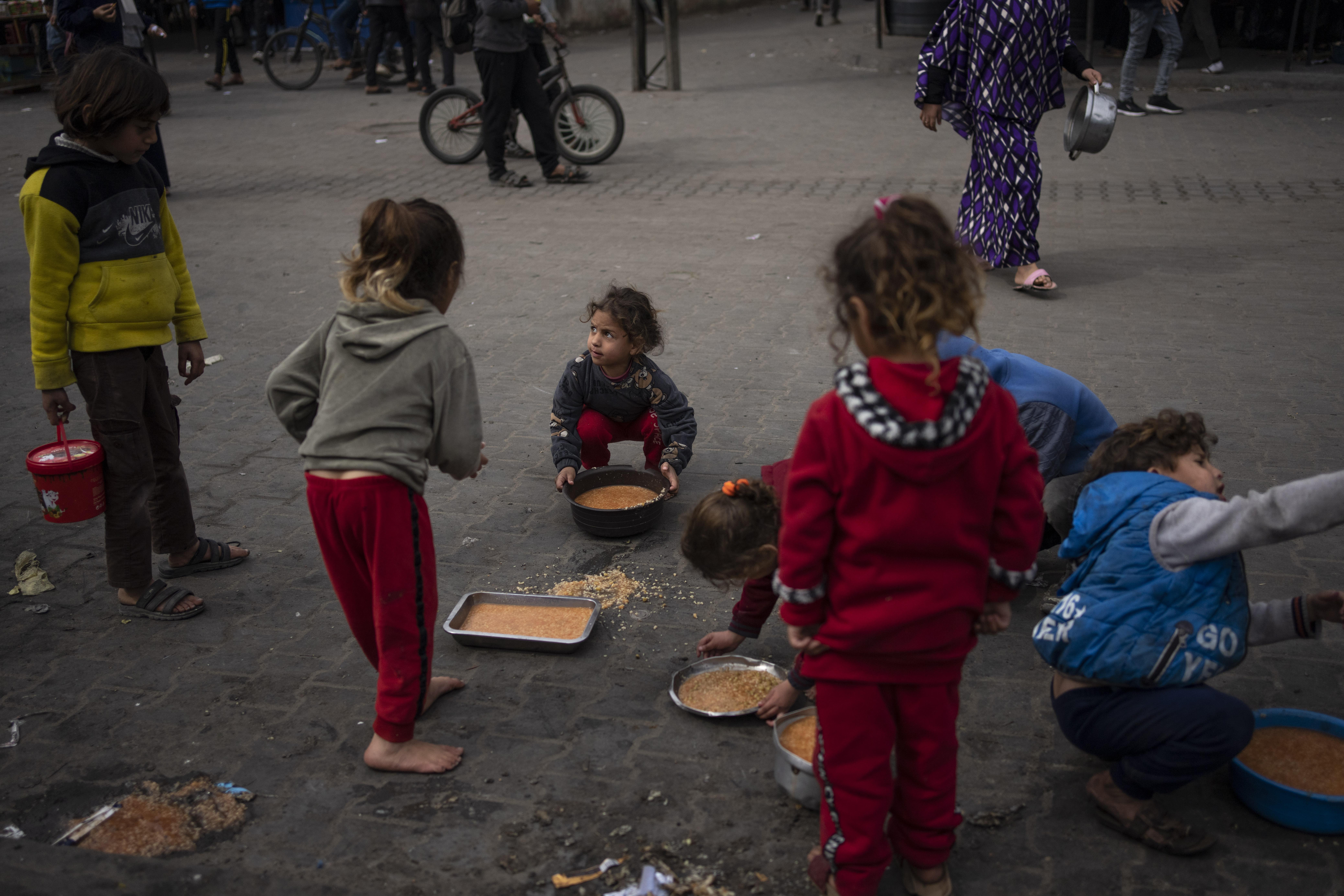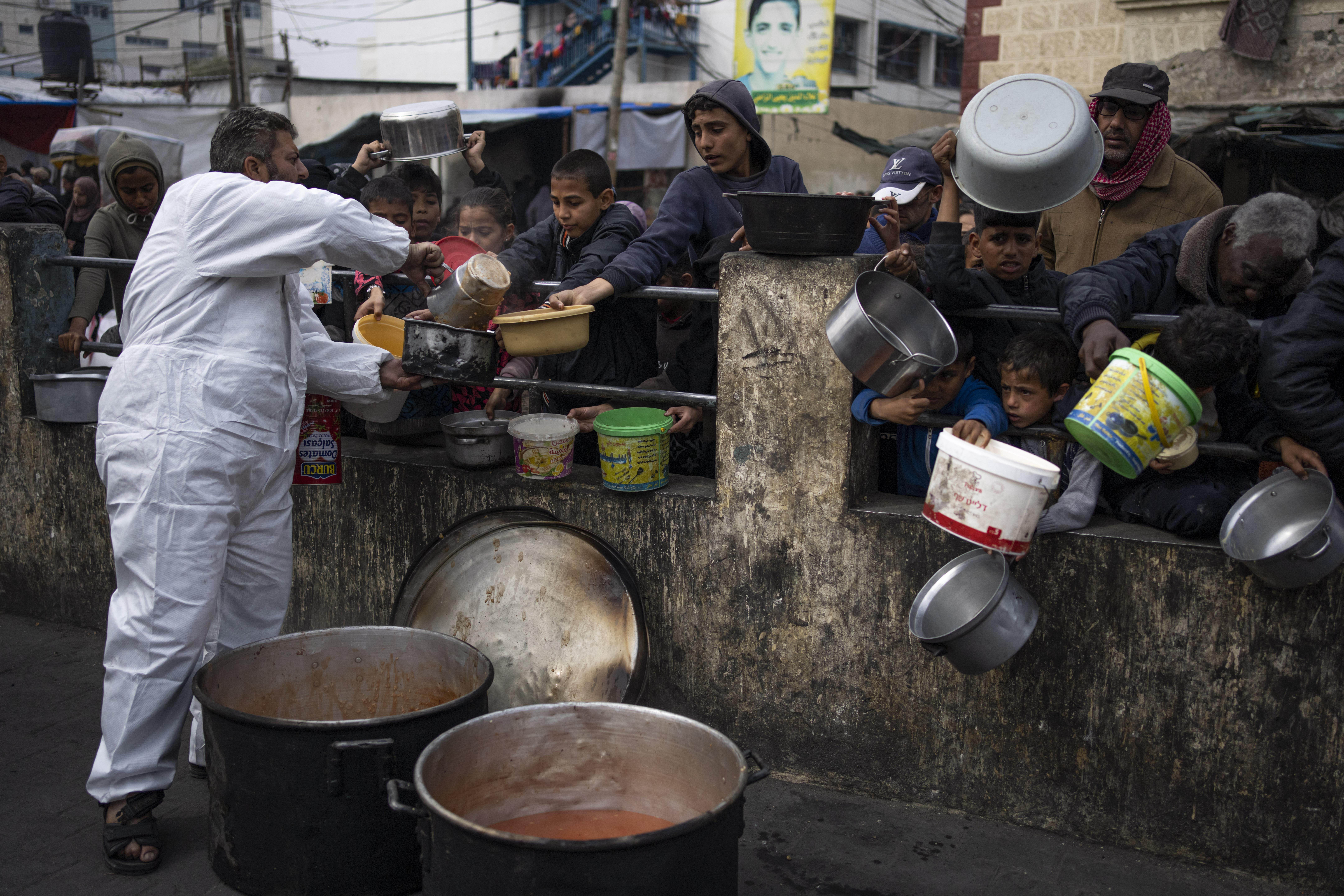 Palestinian kids receive free food in Rafah, Gaza Strip, Feb 23, 2024. (PHOTO / AP)
Palestinian kids receive free food in Rafah, Gaza Strip, Feb 23, 2024. (PHOTO / AP)
UNITED NATIONS - At least 576,000 people in the Gaza Strip - one quarter of the population - are one step away from famine, a senior UN aid official told the Security Council on Tuesday, warning that widespread famine could be "almost inevitable" without action.
"Very little will be possible while hostilities continue and while there is a risk that they will spread into the overcrowded areas in the south of Gaza. We therefore reiterate our call for a ceasefire," said Ramesh Rajasingham, coordination director of the UN Office for the Coordination of Humanitarian Affairs.
One in six children under age 2 in northern Gaza suffers from acute malnutrition and wasting and practically all the 2.3 million people in the Palestinian enclave rely on "woefully inadequate" food aid to survive, he told the Security Council.
ALSO READ: Gaza faces famine amid conflict
Rajasingham said the UN and aid groups face "overwhelming obstacles just to get a bare minimum of supplies into Gaza." These include crossing closures, restrictions on movement and communication, onerous vetting procedures, unrest, damaged roads and unexploded ordnance, he said.
Israel is committed to improving the humanitarian situation in Gaza, said Israel's deputy UN Ambassador Jonathan Miller, adding that the limitations on the quantity and pace of aid are dependent on the capacity of the UN and other agencies.
"Israel has been clear in its policies. There is absolutely no limit, and I repeat, there is no limit to the amount of humanitarian aid that can be sent to the civilian population of Gaza," Miller told the Security Council.
 Palestinians line up for free food in Rafah, Gaza Strip, Feb 23, 2024. (PHOTO / AP)
Palestinians line up for free food in Rafah, Gaza Strip, Feb 23, 2024. (PHOTO / AP)
'Israel must do more'
The US urged its ally Israel to keep border crossings open for humanitarian aid deliveries to Gaza and to facilitate opening of more crossings, Deputy US Ambassador to the UN Robert Wood told the Security Council.
Maurizio Martina, deputy director-general of the Food and Agriculture Organization, warned on Tuesday that the agricultural infrastructure in Gaza has been devastated
"Simply put, Israel must do more," he said. "We continue to call on Israel to improve deconfliction procedures to ensure aid can move safely and securely."
The World Food Programme "is ready to swiftly expand and scale up our operations if there is a ceasefire agreement," WFP Deputy Executive Director Carl Skau told the Security Council.
"But in the meantime, the risk of famine is being fueled by the inability to bring critical food supplies into Gaza in sufficient quantities, and the almost impossible operating conditions faced by our staff on the ground," Skau said.
ALSO READ: China urges US to play constructive role in Gaza ceasefire
Meanwhile, Maurizio Martina, deputy director-general of the Food and Agriculture Organization, warned on Tuesday that the agricultural infrastructure in Gaza has been devastated.
Martina highlighted at the Security Council meeting on the protection of civilians in armed conflicts the dire consequences for the region's agricultural sector, which is a "critical source of sustenance and income" for its residents.
"The key findings are troubling," Martina said, shedding light on the extensive damage inflicted upon Gaza's agricultural landscape.
He detailed the significant toll the conflict has taken, from the decimation of the fishing industry, a vital source of livelihood for over 100,000 people, to the alarming mortality rate among livestock due to airstrikes and a scarcity of essential resources like water and fodder.
ALSO READ: Israeli army presents operational attack plan in Gaza's Rafah
The war in Gaza began when Hamas fighters attacked Israel on Oct 7, killing around 1,200 people and seizing 253 hostages, according to Israeli tallies. Israel's air and ground campaign in Gaza has since killed around 30,000 Palestinians, health authorities in the Hamas-run enclave say.
"Starvation as a method of warfare is illegal and Guyana condemns those who are deliberately using this as a tool against the population in Gaza," Guyana's UN Ambassador Carolyn Rodrigues-Birkett told the 15-member council.
Israel's campaign in Gaza "is a collective punishment for the Palestinian civilian people," Algeria's UN Ambassador Amar Bendjama told the Security Council. "Our silence grants a license to kill and to starve the Palestinian population."
With Xinhua inputs


